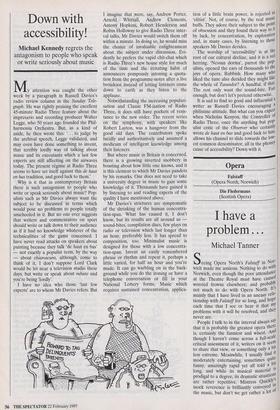Down with accessibility!
Michael Kennedy regrets the antagonism to people who speak or write seriously about music My attention was caught the other week by a paragraph in Russell Davies's radio review column in the Sunday Tele- graph. He was rightly praising the excellent 45-minute Radio Three feature about the impresario and recording producer Walter Legge, who 50 years ago founded the Phil- harmonia Orchestra. But, as a kind of aside, he then wrote this: '... to judge by the archival speech, Legge validated, and may even have done something to invent, that terribly lordly way of talking about music and its executants which a last few experts are still affecting on the airwaves today. The present regime at Radio Three seems to have set itself against this de haut en bas tradition, and good luck to them.'
Why is it that in contemporary Britain there is such antagonism to people who write or speak seriously about music? Pop- ulists such as Mr Davies always want the subject to be discussed in terms which would pose no problems to people totally unschooled in it. But no one ever suggests that writers and commentators on sport should write or talk down to their audience as if it had no knowledge whatever of the technicalities of the game concerned. I have never read attacks on speakers about painting because they talk `de haut en bas' — not exactly a populist term, by the way — about chiaroscuro, although, come to think of it, I don't suppose Lord Clark would be let near a television studio these days, but write or speak about rubato and you're being 'lordly'.
I have no idea who those 'last few experts' are to whom Mr Davies refers. But I imagine that were, say, Andrew Porter, Arnold Whittall, Andrew Clements, Antony Hopkins, Robert Henderson and Robin Holloway to give Radio Three inter- val talks, Mr Davies would switch them off within a minute. In doing so, he would miss the chance of invaluable enlightenment about the subject under discussion. Evi- dently he prefers the vapid chit-chat which is Radio Three's new house style for much of the time and the irritating habit of announcers pompously intoning a quota- tion from the programme-notes after a live broadcast instead of letting listeners come down to earth as they listen to the applause.
Notwithstanding the increasing populari- sation and Classic FM-isation of Radio Three, it does still have pockets of resis- tance to the new order. The recent series on the symphony, with speakers like Robert Layton, was a hangover from the good old days. The contributors spoke lucidly and authoritatively and assumed a modicum of intelligent knowledge among their listeners.
But where music in Britain is concerned, there is a growing inverted snobbery in boasting about how little one knows, and it is this element to which Mr Davies panders by his remarks. One does not need to take a university degree in music to gain some knowledge of it. Thousands have gained it by listening to and reading experts of the quality I have mentioned above.
Mr Davies's strictures are symptomatic of the shrinking of the human concentra- tion-span. What has caused it, I don't know, but its results are all around us sound-bites, compilation discs, few plays on radio or television which last longer than an hour, preferably less. It has spread to composition, too. Minimalist music is designed for those with a low concentra- tion-span. Invent an easily remembered phrase or rhythm and repeat it, perhaps a little varied, for half an hour and you're made. It can go warbling on in the back- ground while you do the ironing or have a telephone conversation or fill in your National Lottery forms. Music which requires sustained concentration, applica- tion of a little brain power, is rejected as `elitist'. Not, of course, by the real music buffs. They adore their subject to the point of obsession and they found their way to it by luck, by concentration, by exploration and, in many cases, by listening to those speakers Mr Davies derides. The worship of 'accessibility' is at the root of our cultural decline, and it is a red herring. 'Nessun dorma', parrot the pop- ulists, opened the ears of thousands to the joys of opera. Rubbish. How many who liked the tune also decided they might like the whole of Turandot? A handful, if that. The rest only want the sound-bite. Fair enough, but don't let's pretend otherwise. It is sad to find so good and influential a writer as Russell Davies encouraging a philistine attitude. But what can you expect when Nicholas Kenyon, the Controller of Radio Three, once the anything but pop- ulist critic of the Observer who certainly wrote de haut en has and good luck to him, allows his channel to slide towards the low- est common denominator, all in the phoneY cause of accessibility? Down with it.


























































 Previous page
Previous page